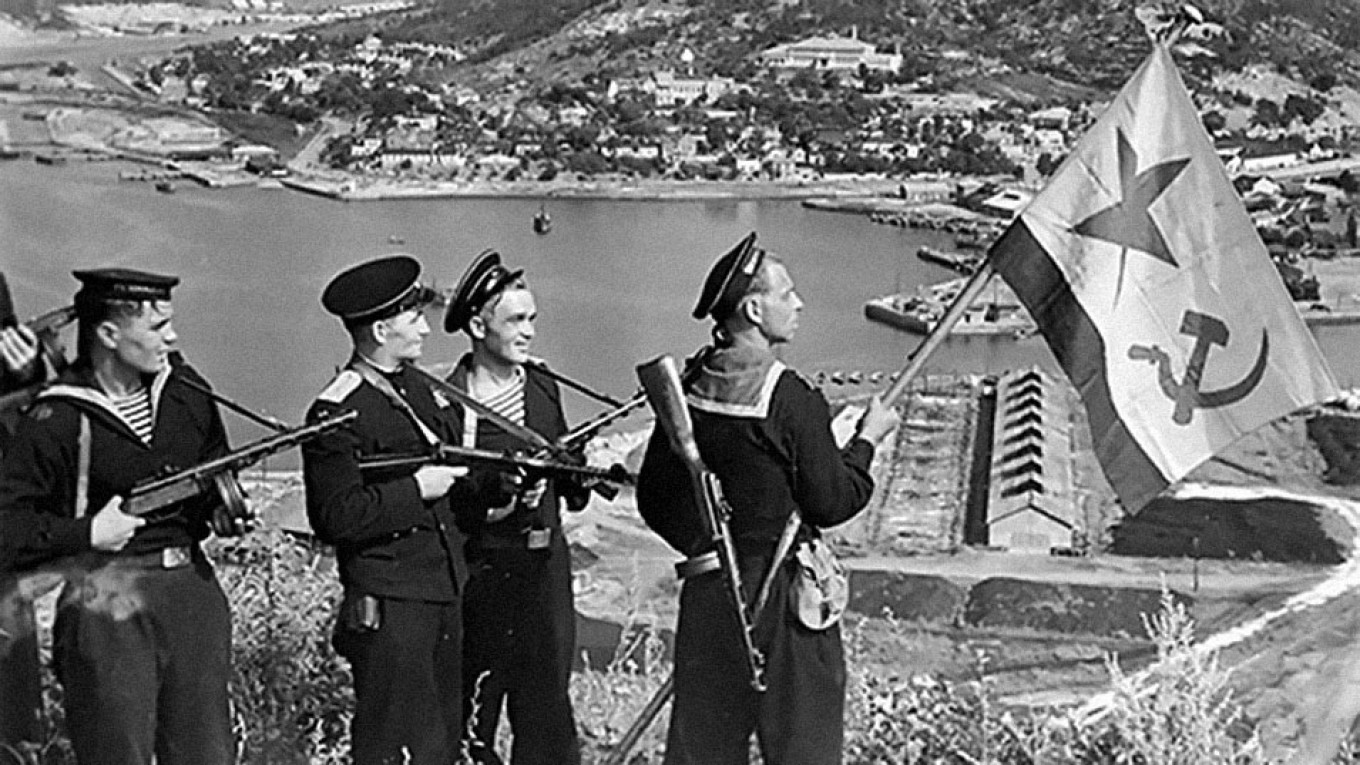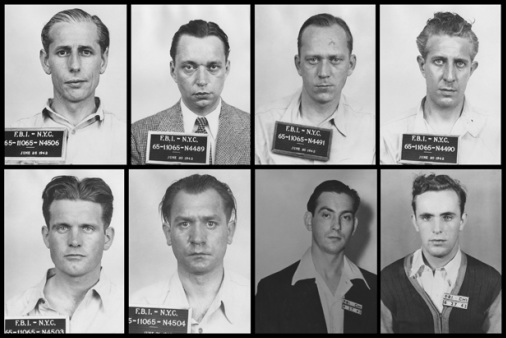
Nixon resigns
In an evening televised address on August 8, 1974, President Richard M. Nixon announces his intention to become the first president in American history to resign. With impeachment proceedings underway against him for his involvement in the Watergate affair, Nixon was finally bowing to pressure from the public and Congress to leave the White House.
“By taking this action,” he said in a solemn address from the Oval Office, “I hope that I will have hastened the start of the process of healing which is so desperately needed in America.”
Just before noon the next day, Nixon officially ended his term as the 37th president of the United States. Before departing with his family in a helicopter from the White House lawn, he smiled farewell and enigmatically raised his arms in a victory or peace salute. The helicopter door was then closed, and the Nixon family began their journey home to San Clemente, California. Minutes later, Vice President Gerald R. Ford was sworn in as the 38th president of the United States in the East Room of the White House.
After taking the oath of office, President Ford spoke to the nation in a television address, declaring, “My fellow Americans, our long national nightmare is over.” He later pardoned Nixon for any crimes he may have committed while in office, explaining that he wanted to end the national divisions created by the Watergate scandal.
On June 17, 1972, five men, including a salaried security coordinator for President Nixon’s reelection committee, were arrested for breaking into and illegally wiretapping the Democratic National Committee headquarters in the Washington, D.C., Watergate complex. Soon after, two other former White House aides were implicated in the break-in, but the Nixon administration denied any involvement. Later that year, reporters Carl Bernstein and Bob Woodward of The Washington Post discovered a higher-echelon conspiracy surrounding the incident, and a political scandal of unprecedented magnitude erupted.
In May 1973, the Senate Select Committee on Presidential Campaign Activities, headed by Senator Sam Ervin of North Carolina, began televised proceedings on the rapidly escalating Watergate affair. One week later, Harvard law professor Archibald Cox was sworn in as special Watergate prosecutor. During the Senate hearings, former White House legal counsel John Dean testified that the Watergate break-in had been approved by former Attorney General John Mitchell with the knowledge of White House advisers John Ehrlichman and H.R. Haldeman, and that President Nixon had been aware of the cover-up.
Meanwhile, Watergate prosecutor Cox and his staff began to uncover widespread evidence of political espionage by the Nixon reelection committee, illegal wiretapping of thousands of citizens by the administration, and contributions to the Republican Party in return for political favors.
In July, the existence of what were to be called the Watergate tapes–official recordings of White House conversations between Nixon and his staff–was revealed during the Senate hearings. Cox subpoenaed these tapes, and after three months of delay President Nixon agreed to send summaries of the recordings. Cox rejected the summaries, and Nixon fired him. His successor as special prosecutor, Leon Jaworski, leveled indictments against several high-ranking administration officials, including Mitchell and Dean, who were duly convicted.
Public confidence in the president rapidly waned, and by the end of July 1974 the House Judiciary Committee had adopted three articles of impeachment against President Nixon: obstruction of justice, abuse of presidential powers, and hindrance of the impeachment process. On July 30, under coercion from the Supreme Court, Nixon finally released the Watergate tapes. On August 5, transcripts of the recordings were released, including a segment in which the president was heard instructing Haldeman to order the FBI to halt the Watergate investigation. Three days later, Nixon announced his resignation.

21ST CENTURY
2008
5-day long Russo-Georgian War begins
On August 8, 2008, a long-simmering conflict between Russia and Georgia boiled over into a shooting war between the small Caucasian nation and the superpower of which it was once a part. The brief Russo-Georgian War was the most violent episode in a conflict that began more than a decade before.

US GOVERNMENT
2009
Sonia Sotomayor is sworn in as an Associate Justice of the Supreme Court
On August 8, 2009, Sonia Sotomayor is sworn in as an Associate Justice of the Supreme Court. Born in the Bronx to Puerto Rican parents, Sotomayor is the first Hispanic justice to serve on the nation's highest court. Sotomayor's mother was an orphan from rural Puerto Rico.

RELIGION
1844
Brigham Young chosen to lead Mormon Church
After Joseph Smith, the founder and prophet of The Church of Jesus Christ of Latter-day Saints, or Mormonism, and his brother, Hyrum, were murdered by an angry mob in an Illinois prison six weeks earlier, Elder Brigham Young is chosen to be the Church’s next leader.

WORLD WAR II
1945
Soviets declare war on Japan; invade Manchuria
On August 8, 1945, the Soviet Union officially declares war on Japan, pouring more than 1 million Soviet soldiers into Japanese-occupied Manchuria, northeastern China, to take on the 700,000-strong Japanese army. The dropping of the bomb on Hiroshima by the Americans did not have the effect intended: unconditional surrender by Japan.

19TH CENTURY
1879
Emiliano Zapata born
Emiliano Zapata, a leader of peasants and indigenous people during the Mexican Revolution, is born in Anenecuilco, Mexico. Born a peasant, Zapata was forced into the Mexican army in 1908 following his attempt to recover village lands taken over by a rancher.

WORLD WAR II
1942
German saboteurs executed in Washington
During World War II, six German saboteurs who secretly entered the United States on a mission to attack its civil infrastructure are executed by the United States for spying. Two other saboteurs who disclosed the plot to the FBI and aided U.S. authorities in their manhunt for their collaborators were imprisoned.

SPORTS
1988
Lights go on at Wrigley
On August 8, 1988, the Chicago Cubs host the first night game in the history of Wrigley Field. The first-ever night game in professional baseball took place nearly 60 years earlier, on May 2, 1930, when a Des Moines, Iowa, team hosted Wichita for a Western League game.
ART, LITERATURE, AND FILM HISTORY
1988
Gangsta rap hits the mainstream with the release of N.W.A’s "Straight Outta Compton"
As of 1988, the top-selling hip hop albums of all time were Run D.M.C.’s Raising Hell and the Beastie Boys’ License to Ill, both released in 1987 and both selling millions without ruffling many feathers. In June 1988, Public Enemy released It Takes A Nation of Millions To Hold Us Back, an album that broke new ground both musically and lyrically with its richly layered, aggressive sound and its angry, politically conscious content. Yet even Public Enemy were dwarfed commercially by DJ Jazzy Jeff and the Fresh Prince, whose kid-friendly single “Parents Just Don’t Understand” and album He’s the DJ, I’m The Rapper were both Top 5 pop hits that same summer. The group that would truly revolutionize hip hop was N.W.A—”Niggaz With Attitude”—whose debut album, Straight Outta Compton, was released on August 8, 1988.

ART, LITERATURE, AND FILM HISTORY
1986
Spike Lee’s first feature, "She’s Gotta Have It," premieres
On August 8, 1986, actor, writer and director Spike Lee’s first feature-length movie, She’s Gotta Have It, opens in theaters around the United States. Made on a shoestring budget, She’s Gotta Have It was a comedy about a free-spirited African-American woman in Brooklyn, New York.
US GOVERNMENT
1945
President Truman signs United Nations Charter
President Harry S. Truman signs the United Nations Charter and the United States becomes the first nation to complete the ratification process and join the new international organization. Although hopes were high at the time that the United Nations would serve as an arbiter of international disputes, the organization also served as the scene for some memorable Cold War clashes.

CIVIL WAR
1863
Robert E. Lee offers resignation as commander of the Confederate army
In the aftermath of his defeat at Gettysburg, Pennsylvania, Confederate General Robert E. Lee sends a letter of resignation as commander of the Army of Northern Virginia to Confederate President Jefferson Davis.

WORLD WAR I
1918
Battle of Amiens
On August 8, 1918, the Allies launch a series of offensive operations against German positions on the Western Front during World War I with a punishing attack at Amiens, on the Somme River in northwestern France.
TODAY IN NIGERIA HISTORY
1950 A group of radicals issued the Sawaba Declaration, which led to the formation of the longest-lived and most well-supported radical party in northern Nigeria, the Northern Elements Progressive Union (NEPU).

1952 Dr. Chris Nwabueze Ngige born

Comments
Post a Comment